Business Law Assignment: Class Action Lawsuit and Oppression Remedy
VerifiedAdded on 2023/05/30
|11
|2803
|352
Report
AI Summary
This business law assignment analyzes a class action lawsuit brought against the North Halton Golf and Country Club Limited. The core issue revolves around a share exchange program that allegedly caused economic loss to non-member and non-golfing shareholders, prompting them to seek dissolution and distribution of the club's assets. The assignment delves into legal issues, including whether the shareholders' claims constitute an actionable wrong under the Canada Business Corporations Act, specifically Sections 122 and 241, and whether they are entitled to declaratory relief, statutory remedies, and damages. The report examines the obligations of directors, the concept of business judgment, and the court's role in interfering with such judgments. It references relevant legal principles, including the 'reasonable expectation' of shareholders, oppression remedies, and the fiduciary duties of directors. The analysis applies these principles to the specific facts of the case, evaluating the shareholders' expectations, the board's actions, and the evidence of oppression, ultimately determining whether the shareholders are entitled to the remedies they seek.
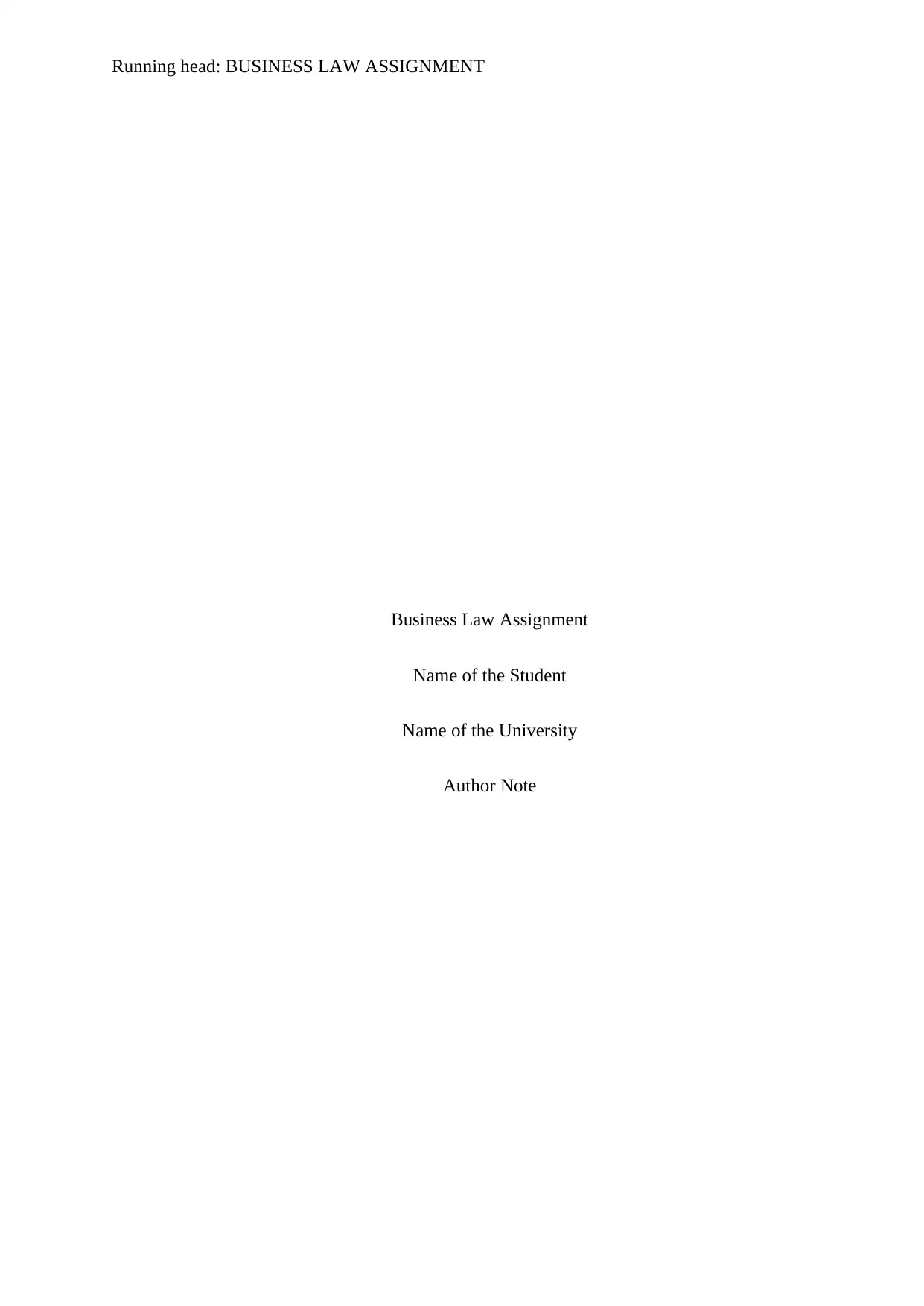
Running head: BUSINESS LAW ASSIGNMENT
Business Law Assignment
Name of the Student
Name of the University
Author Note
Business Law Assignment
Name of the Student
Name of the University
Author Note
Paraphrase This Document
Need a fresh take? Get an instant paraphrase of this document with our AI Paraphraser
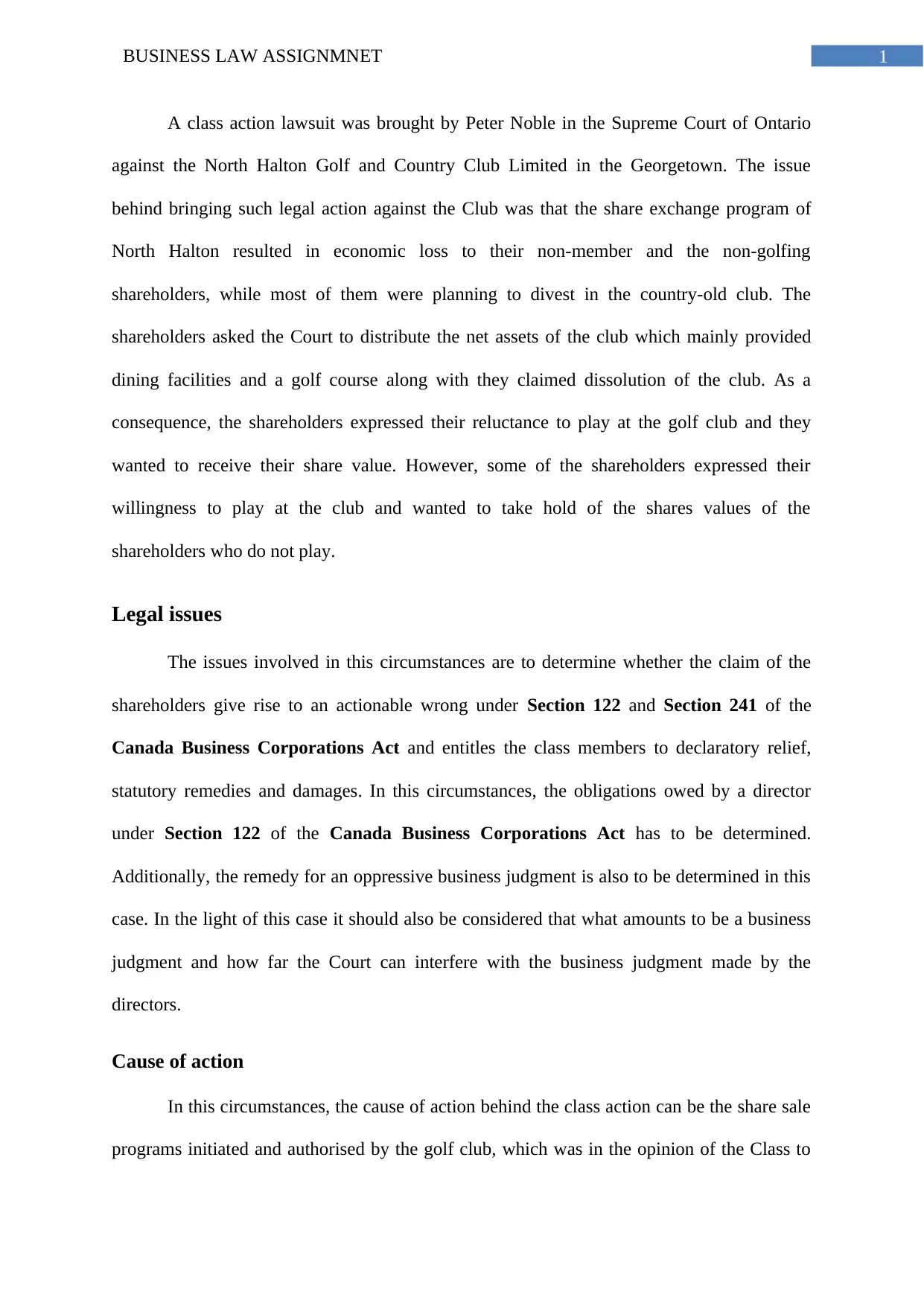
1BUSINESS LAW ASSIGNMNET
A class action lawsuit was brought by Peter Noble in the Supreme Court of Ontario
against the North Halton Golf and Country Club Limited in the Georgetown. The issue
behind bringing such legal action against the Club was that the share exchange program of
North Halton resulted in economic loss to their non-member and the non-golfing
shareholders, while most of them were planning to divest in the country-old club. The
shareholders asked the Court to distribute the net assets of the club which mainly provided
dining facilities and a golf course along with they claimed dissolution of the club. As a
consequence, the shareholders expressed their reluctance to play at the golf club and they
wanted to receive their share value. However, some of the shareholders expressed their
willingness to play at the club and wanted to take hold of the shares values of the
shareholders who do not play.
Legal issues
The issues involved in this circumstances are to determine whether the claim of the
shareholders give rise to an actionable wrong under Section 122 and Section 241 of the
Canada Business Corporations Act and entitles the class members to declaratory relief,
statutory remedies and damages. In this circumstances, the obligations owed by a director
under Section 122 of the Canada Business Corporations Act has to be determined.
Additionally, the remedy for an oppressive business judgment is also to be determined in this
case. In the light of this case it should also be considered that what amounts to be a business
judgment and how far the Court can interfere with the business judgment made by the
directors.
Cause of action
In this circumstances, the cause of action behind the class action can be the share sale
programs initiated and authorised by the golf club, which was in the opinion of the Class to
A class action lawsuit was brought by Peter Noble in the Supreme Court of Ontario
against the North Halton Golf and Country Club Limited in the Georgetown. The issue
behind bringing such legal action against the Club was that the share exchange program of
North Halton resulted in economic loss to their non-member and the non-golfing
shareholders, while most of them were planning to divest in the country-old club. The
shareholders asked the Court to distribute the net assets of the club which mainly provided
dining facilities and a golf course along with they claimed dissolution of the club. As a
consequence, the shareholders expressed their reluctance to play at the golf club and they
wanted to receive their share value. However, some of the shareholders expressed their
willingness to play at the club and wanted to take hold of the shares values of the
shareholders who do not play.
Legal issues
The issues involved in this circumstances are to determine whether the claim of the
shareholders give rise to an actionable wrong under Section 122 and Section 241 of the
Canada Business Corporations Act and entitles the class members to declaratory relief,
statutory remedies and damages. In this circumstances, the obligations owed by a director
under Section 122 of the Canada Business Corporations Act has to be determined.
Additionally, the remedy for an oppressive business judgment is also to be determined in this
case. In the light of this case it should also be considered that what amounts to be a business
judgment and how far the Court can interfere with the business judgment made by the
directors.
Cause of action
In this circumstances, the cause of action behind the class action can be the share sale
programs initiated and authorised by the golf club, which was in the opinion of the Class to
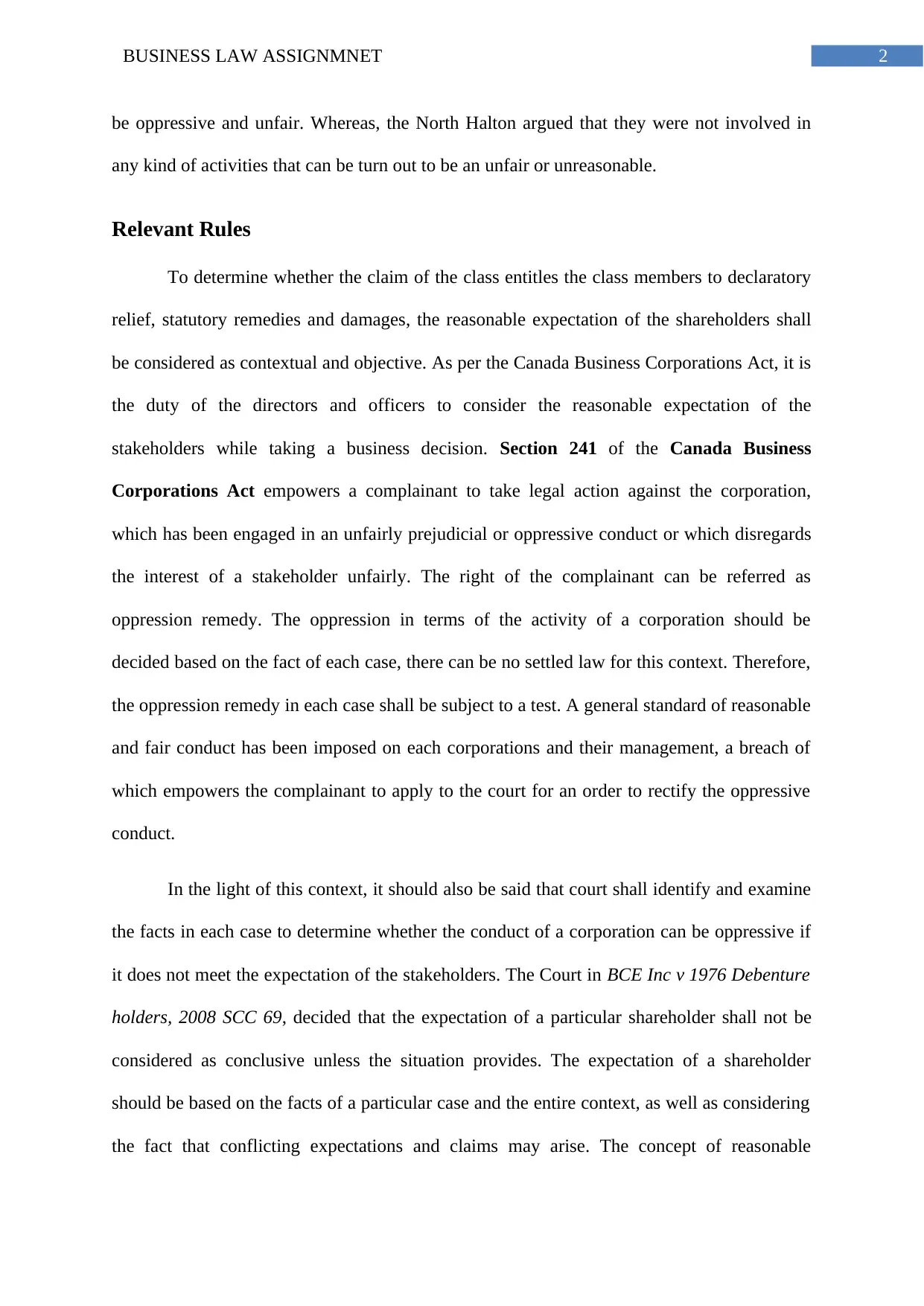
2BUSINESS LAW ASSIGNMNET
be oppressive and unfair. Whereas, the North Halton argued that they were not involved in
any kind of activities that can be turn out to be an unfair or unreasonable.
Relevant Rules
To determine whether the claim of the class entitles the class members to declaratory
relief, statutory remedies and damages, the reasonable expectation of the shareholders shall
be considered as contextual and objective. As per the Canada Business Corporations Act, it is
the duty of the directors and officers to consider the reasonable expectation of the
stakeholders while taking a business decision. Section 241 of the Canada Business
Corporations Act empowers a complainant to take legal action against the corporation,
which has been engaged in an unfairly prejudicial or oppressive conduct or which disregards
the interest of a stakeholder unfairly. The right of the complainant can be referred as
oppression remedy. The oppression in terms of the activity of a corporation should be
decided based on the fact of each case, there can be no settled law for this context. Therefore,
the oppression remedy in each case shall be subject to a test. A general standard of reasonable
and fair conduct has been imposed on each corporations and their management, a breach of
which empowers the complainant to apply to the court for an order to rectify the oppressive
conduct.
In the light of this context, it should also be said that court shall identify and examine
the facts in each case to determine whether the conduct of a corporation can be oppressive if
it does not meet the expectation of the stakeholders. The Court in BCE Inc v 1976 Debenture
holders, 2008 SCC 69, decided that the expectation of a particular shareholder shall not be
considered as conclusive unless the situation provides. The expectation of a shareholder
should be based on the facts of a particular case and the entire context, as well as considering
the fact that conflicting expectations and claims may arise. The concept of reasonable
be oppressive and unfair. Whereas, the North Halton argued that they were not involved in
any kind of activities that can be turn out to be an unfair or unreasonable.
Relevant Rules
To determine whether the claim of the class entitles the class members to declaratory
relief, statutory remedies and damages, the reasonable expectation of the shareholders shall
be considered as contextual and objective. As per the Canada Business Corporations Act, it is
the duty of the directors and officers to consider the reasonable expectation of the
stakeholders while taking a business decision. Section 241 of the Canada Business
Corporations Act empowers a complainant to take legal action against the corporation,
which has been engaged in an unfairly prejudicial or oppressive conduct or which disregards
the interest of a stakeholder unfairly. The right of the complainant can be referred as
oppression remedy. The oppression in terms of the activity of a corporation should be
decided based on the fact of each case, there can be no settled law for this context. Therefore,
the oppression remedy in each case shall be subject to a test. A general standard of reasonable
and fair conduct has been imposed on each corporations and their management, a breach of
which empowers the complainant to apply to the court for an order to rectify the oppressive
conduct.
In the light of this context, it should also be said that court shall identify and examine
the facts in each case to determine whether the conduct of a corporation can be oppressive if
it does not meet the expectation of the stakeholders. The Court in BCE Inc v 1976 Debenture
holders, 2008 SCC 69, decided that the expectation of a particular shareholder shall not be
considered as conclusive unless the situation provides. The expectation of a shareholder
should be based on the facts of a particular case and the entire context, as well as considering
the fact that conflicting expectations and claims may arise. The concept of reasonable
⊘ This is a preview!⊘
Do you want full access?
Subscribe today to unlock all pages.

Trusted by 1+ million students worldwide
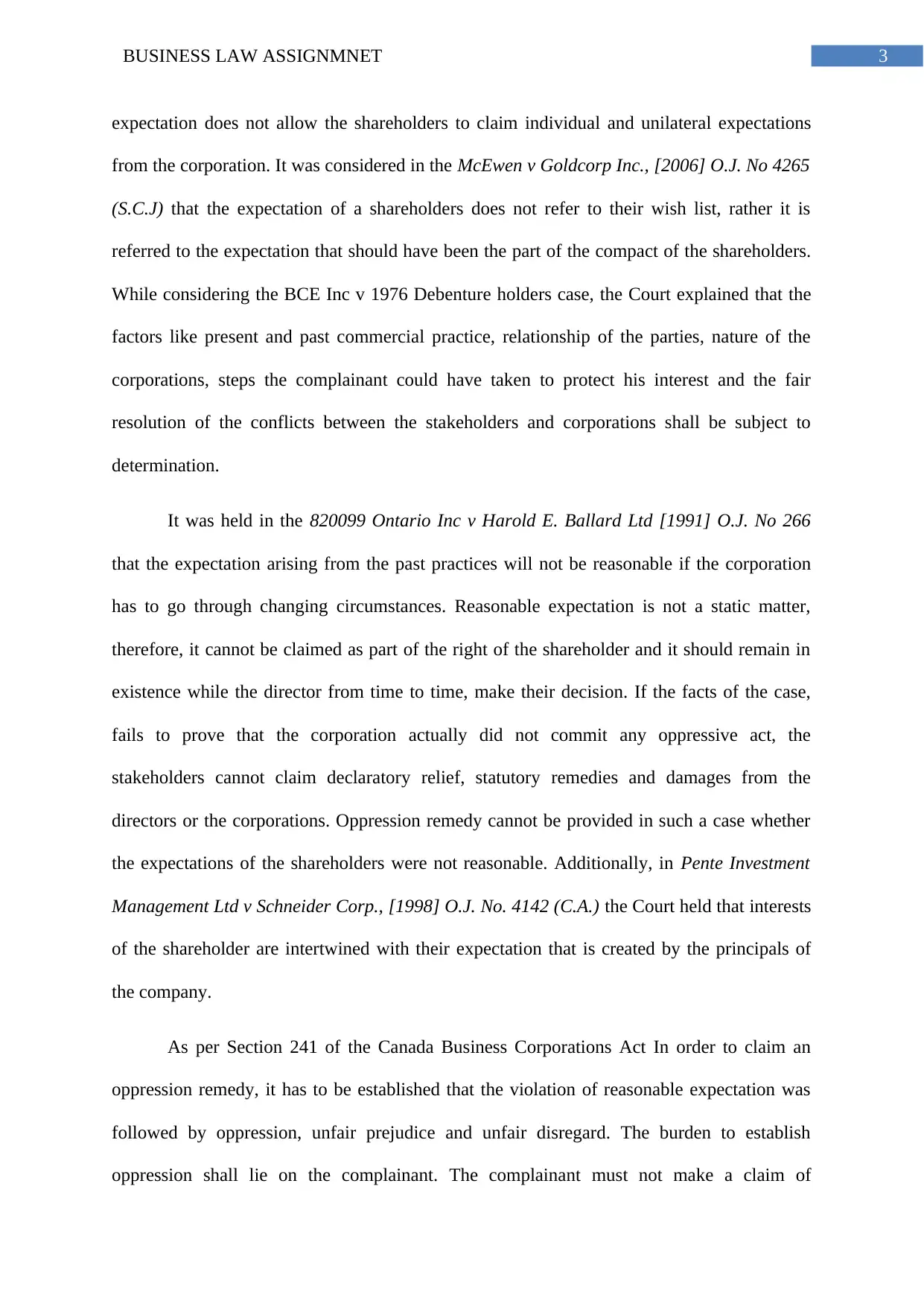
3BUSINESS LAW ASSIGNMNET
expectation does not allow the shareholders to claim individual and unilateral expectations
from the corporation. It was considered in the McEwen v Goldcorp Inc., [2006] O.J. No 4265
(S.C.J) that the expectation of a shareholders does not refer to their wish list, rather it is
referred to the expectation that should have been the part of the compact of the shareholders.
While considering the BCE Inc v 1976 Debenture holders case, the Court explained that the
factors like present and past commercial practice, relationship of the parties, nature of the
corporations, steps the complainant could have taken to protect his interest and the fair
resolution of the conflicts between the stakeholders and corporations shall be subject to
determination.
It was held in the 820099 Ontario Inc v Harold E. Ballard Ltd [1991] O.J. No 266
that the expectation arising from the past practices will not be reasonable if the corporation
has to go through changing circumstances. Reasonable expectation is not a static matter,
therefore, it cannot be claimed as part of the right of the shareholder and it should remain in
existence while the director from time to time, make their decision. If the facts of the case,
fails to prove that the corporation actually did not commit any oppressive act, the
stakeholders cannot claim declaratory relief, statutory remedies and damages from the
directors or the corporations. Oppression remedy cannot be provided in such a case whether
the expectations of the shareholders were not reasonable. Additionally, in Pente Investment
Management Ltd v Schneider Corp., [1998] O.J. No. 4142 (C.A.) the Court held that interests
of the shareholder are intertwined with their expectation that is created by the principals of
the company.
As per Section 241 of the Canada Business Corporations Act In order to claim an
oppression remedy, it has to be established that the violation of reasonable expectation was
followed by oppression, unfair prejudice and unfair disregard. The burden to establish
oppression shall lie on the complainant. The complainant must not make a claim of
expectation does not allow the shareholders to claim individual and unilateral expectations
from the corporation. It was considered in the McEwen v Goldcorp Inc., [2006] O.J. No 4265
(S.C.J) that the expectation of a shareholders does not refer to their wish list, rather it is
referred to the expectation that should have been the part of the compact of the shareholders.
While considering the BCE Inc v 1976 Debenture holders case, the Court explained that the
factors like present and past commercial practice, relationship of the parties, nature of the
corporations, steps the complainant could have taken to protect his interest and the fair
resolution of the conflicts between the stakeholders and corporations shall be subject to
determination.
It was held in the 820099 Ontario Inc v Harold E. Ballard Ltd [1991] O.J. No 266
that the expectation arising from the past practices will not be reasonable if the corporation
has to go through changing circumstances. Reasonable expectation is not a static matter,
therefore, it cannot be claimed as part of the right of the shareholder and it should remain in
existence while the director from time to time, make their decision. If the facts of the case,
fails to prove that the corporation actually did not commit any oppressive act, the
stakeholders cannot claim declaratory relief, statutory remedies and damages from the
directors or the corporations. Oppression remedy cannot be provided in such a case whether
the expectations of the shareholders were not reasonable. Additionally, in Pente Investment
Management Ltd v Schneider Corp., [1998] O.J. No. 4142 (C.A.) the Court held that interests
of the shareholder are intertwined with their expectation that is created by the principals of
the company.
As per Section 241 of the Canada Business Corporations Act In order to claim an
oppression remedy, it has to be established that the violation of reasonable expectation was
followed by oppression, unfair prejudice and unfair disregard. The burden to establish
oppression shall lie on the complainant. The complainant must not make a claim of
Paraphrase This Document
Need a fresh take? Get an instant paraphrase of this document with our AI Paraphraser
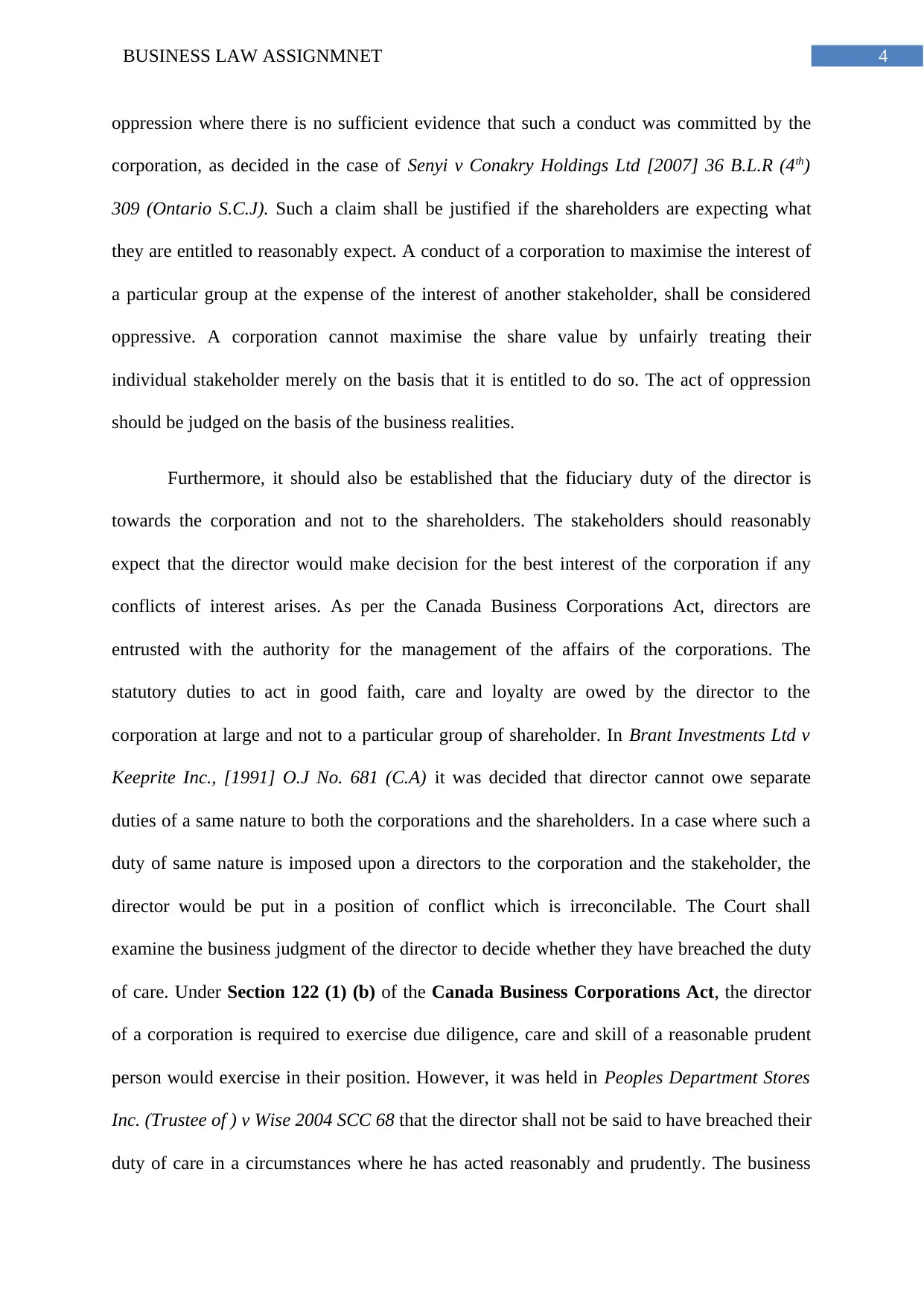
4BUSINESS LAW ASSIGNMNET
oppression where there is no sufficient evidence that such a conduct was committed by the
corporation, as decided in the case of Senyi v Conakry Holdings Ltd [2007] 36 B.L.R (4th)
309 (Ontario S.C.J). Such a claim shall be justified if the shareholders are expecting what
they are entitled to reasonably expect. A conduct of a corporation to maximise the interest of
a particular group at the expense of the interest of another stakeholder, shall be considered
oppressive. A corporation cannot maximise the share value by unfairly treating their
individual stakeholder merely on the basis that it is entitled to do so. The act of oppression
should be judged on the basis of the business realities.
Furthermore, it should also be established that the fiduciary duty of the director is
towards the corporation and not to the shareholders. The stakeholders should reasonably
expect that the director would make decision for the best interest of the corporation if any
conflicts of interest arises. As per the Canada Business Corporations Act, directors are
entrusted with the authority for the management of the affairs of the corporations. The
statutory duties to act in good faith, care and loyalty are owed by the director to the
corporation at large and not to a particular group of shareholder. In Brant Investments Ltd v
Keeprite Inc., [1991] O.J No. 681 (C.A) it was decided that director cannot owe separate
duties of a same nature to both the corporations and the shareholders. In a case where such a
duty of same nature is imposed upon a directors to the corporation and the stakeholder, the
director would be put in a position of conflict which is irreconcilable. The Court shall
examine the business judgment of the director to decide whether they have breached the duty
of care. Under Section 122 (1) (b) of the Canada Business Corporations Act, the director
of a corporation is required to exercise due diligence, care and skill of a reasonable prudent
person would exercise in their position. However, it was held in Peoples Department Stores
Inc. (Trustee of ) v Wise 2004 SCC 68 that the director shall not be said to have breached their
duty of care in a circumstances where he has acted reasonably and prudently. The business
oppression where there is no sufficient evidence that such a conduct was committed by the
corporation, as decided in the case of Senyi v Conakry Holdings Ltd [2007] 36 B.L.R (4th)
309 (Ontario S.C.J). Such a claim shall be justified if the shareholders are expecting what
they are entitled to reasonably expect. A conduct of a corporation to maximise the interest of
a particular group at the expense of the interest of another stakeholder, shall be considered
oppressive. A corporation cannot maximise the share value by unfairly treating their
individual stakeholder merely on the basis that it is entitled to do so. The act of oppression
should be judged on the basis of the business realities.
Furthermore, it should also be established that the fiduciary duty of the director is
towards the corporation and not to the shareholders. The stakeholders should reasonably
expect that the director would make decision for the best interest of the corporation if any
conflicts of interest arises. As per the Canada Business Corporations Act, directors are
entrusted with the authority for the management of the affairs of the corporations. The
statutory duties to act in good faith, care and loyalty are owed by the director to the
corporation at large and not to a particular group of shareholder. In Brant Investments Ltd v
Keeprite Inc., [1991] O.J No. 681 (C.A) it was decided that director cannot owe separate
duties of a same nature to both the corporations and the shareholders. In a case where such a
duty of same nature is imposed upon a directors to the corporation and the stakeholder, the
director would be put in a position of conflict which is irreconcilable. The Court shall
examine the business judgment of the director to decide whether they have breached the duty
of care. Under Section 122 (1) (b) of the Canada Business Corporations Act, the director
of a corporation is required to exercise due diligence, care and skill of a reasonable prudent
person would exercise in their position. However, it was held in Peoples Department Stores
Inc. (Trustee of ) v Wise 2004 SCC 68 that the director shall not be said to have breached their
duty of care in a circumstances where he has acted reasonably and prudently. The business
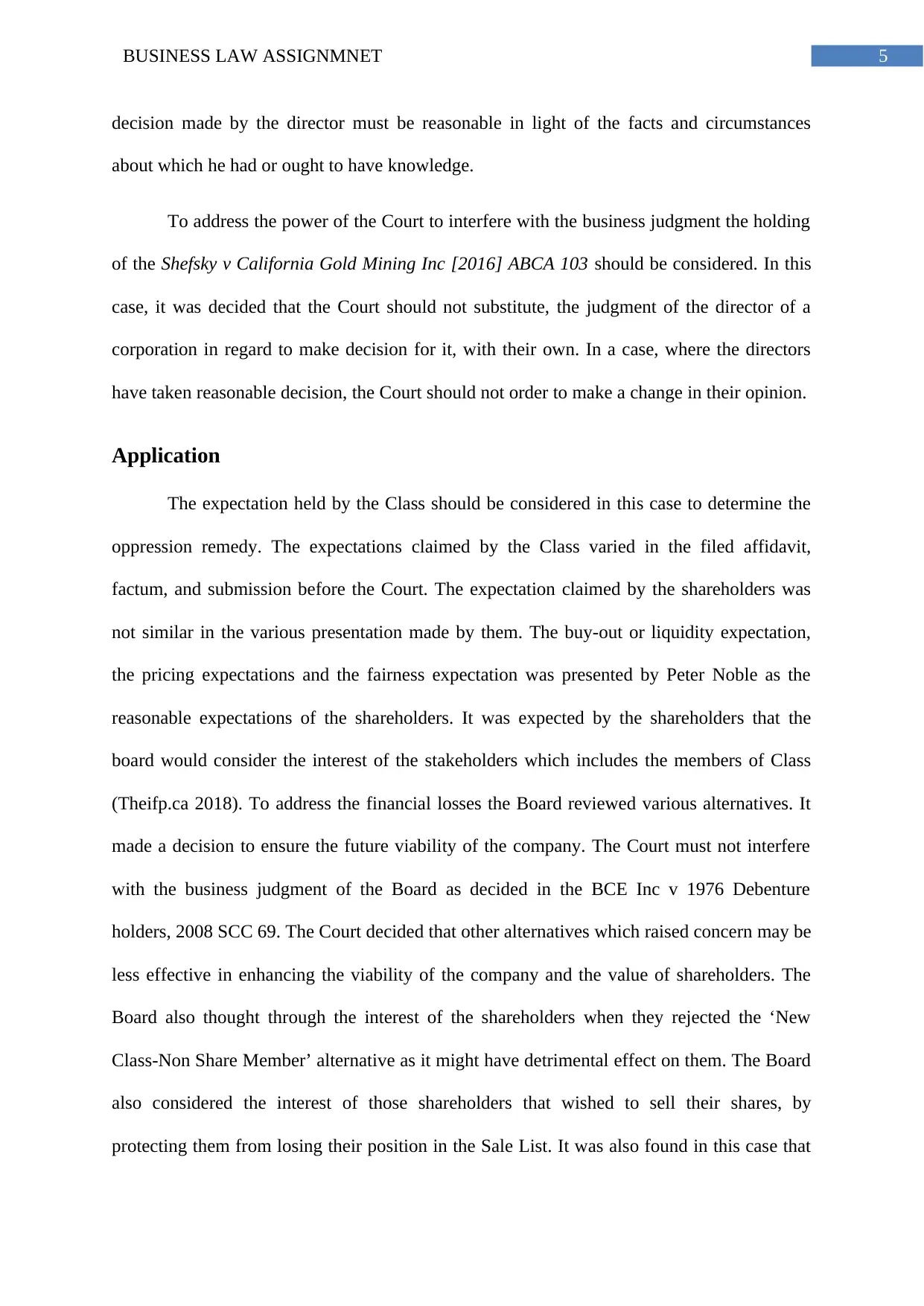
5BUSINESS LAW ASSIGNMNET
decision made by the director must be reasonable in light of the facts and circumstances
about which he had or ought to have knowledge.
To address the power of the Court to interfere with the business judgment the holding
of the Shefsky v California Gold Mining Inc [2016] ABCA 103 should be considered. In this
case, it was decided that the Court should not substitute, the judgment of the director of a
corporation in regard to make decision for it, with their own. In a case, where the directors
have taken reasonable decision, the Court should not order to make a change in their opinion.
Application
The expectation held by the Class should be considered in this case to determine the
oppression remedy. The expectations claimed by the Class varied in the filed affidavit,
factum, and submission before the Court. The expectation claimed by the shareholders was
not similar in the various presentation made by them. The buy-out or liquidity expectation,
the pricing expectations and the fairness expectation was presented by Peter Noble as the
reasonable expectations of the shareholders. It was expected by the shareholders that the
board would consider the interest of the stakeholders which includes the members of Class
(Theifp.ca 2018). To address the financial losses the Board reviewed various alternatives. It
made a decision to ensure the future viability of the company. The Court must not interfere
with the business judgment of the Board as decided in the BCE Inc v 1976 Debenture
holders, 2008 SCC 69. The Court decided that other alternatives which raised concern may be
less effective in enhancing the viability of the company and the value of shareholders. The
Board also thought through the interest of the shareholders when they rejected the ‘New
Class-Non Share Member’ alternative as it might have detrimental effect on them. The Board
also considered the interest of those shareholders that wished to sell their shares, by
protecting them from losing their position in the Sale List. It was also found in this case that
decision made by the director must be reasonable in light of the facts and circumstances
about which he had or ought to have knowledge.
To address the power of the Court to interfere with the business judgment the holding
of the Shefsky v California Gold Mining Inc [2016] ABCA 103 should be considered. In this
case, it was decided that the Court should not substitute, the judgment of the director of a
corporation in regard to make decision for it, with their own. In a case, where the directors
have taken reasonable decision, the Court should not order to make a change in their opinion.
Application
The expectation held by the Class should be considered in this case to determine the
oppression remedy. The expectations claimed by the Class varied in the filed affidavit,
factum, and submission before the Court. The expectation claimed by the shareholders was
not similar in the various presentation made by them. The buy-out or liquidity expectation,
the pricing expectations and the fairness expectation was presented by Peter Noble as the
reasonable expectations of the shareholders. It was expected by the shareholders that the
board would consider the interest of the stakeholders which includes the members of Class
(Theifp.ca 2018). To address the financial losses the Board reviewed various alternatives. It
made a decision to ensure the future viability of the company. The Court must not interfere
with the business judgment of the Board as decided in the BCE Inc v 1976 Debenture
holders, 2008 SCC 69. The Court decided that other alternatives which raised concern may be
less effective in enhancing the viability of the company and the value of shareholders. The
Board also thought through the interest of the shareholders when they rejected the ‘New
Class-Non Share Member’ alternative as it might have detrimental effect on them. The Board
also considered the interest of those shareholders that wished to sell their shares, by
protecting them from losing their position in the Sale List. It was also found in this case that
⊘ This is a preview!⊘
Do you want full access?
Subscribe today to unlock all pages.

Trusted by 1+ million students worldwide
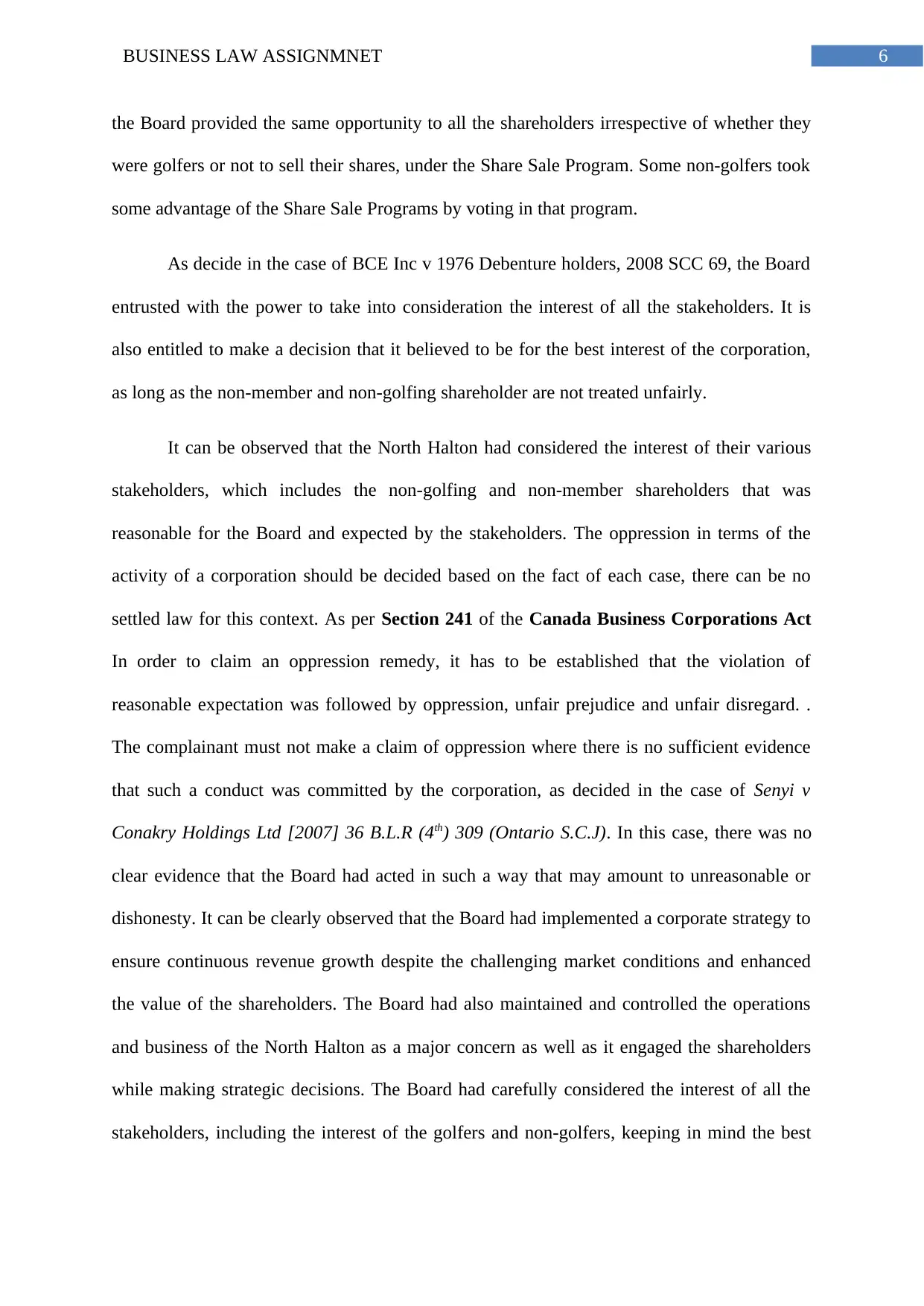
6BUSINESS LAW ASSIGNMNET
the Board provided the same opportunity to all the shareholders irrespective of whether they
were golfers or not to sell their shares, under the Share Sale Program. Some non-golfers took
some advantage of the Share Sale Programs by voting in that program.
As decide in the case of BCE Inc v 1976 Debenture holders, 2008 SCC 69, the Board
entrusted with the power to take into consideration the interest of all the stakeholders. It is
also entitled to make a decision that it believed to be for the best interest of the corporation,
as long as the non-member and non-golfing shareholder are not treated unfairly.
It can be observed that the North Halton had considered the interest of their various
stakeholders, which includes the non-golfing and non-member shareholders that was
reasonable for the Board and expected by the stakeholders. The oppression in terms of the
activity of a corporation should be decided based on the fact of each case, there can be no
settled law for this context. As per Section 241 of the Canada Business Corporations Act
In order to claim an oppression remedy, it has to be established that the violation of
reasonable expectation was followed by oppression, unfair prejudice and unfair disregard. .
The complainant must not make a claim of oppression where there is no sufficient evidence
that such a conduct was committed by the corporation, as decided in the case of Senyi v
Conakry Holdings Ltd [2007] 36 B.L.R (4th) 309 (Ontario S.C.J). In this case, there was no
clear evidence that the Board had acted in such a way that may amount to unreasonable or
dishonesty. It can be clearly observed that the Board had implemented a corporate strategy to
ensure continuous revenue growth despite the challenging market conditions and enhanced
the value of the shareholders. The Board had also maintained and controlled the operations
and business of the North Halton as a major concern as well as it engaged the shareholders
while making strategic decisions. The Board had carefully considered the interest of all the
stakeholders, including the interest of the golfers and non-golfers, keeping in mind the best
the Board provided the same opportunity to all the shareholders irrespective of whether they
were golfers or not to sell their shares, under the Share Sale Program. Some non-golfers took
some advantage of the Share Sale Programs by voting in that program.
As decide in the case of BCE Inc v 1976 Debenture holders, 2008 SCC 69, the Board
entrusted with the power to take into consideration the interest of all the stakeholders. It is
also entitled to make a decision that it believed to be for the best interest of the corporation,
as long as the non-member and non-golfing shareholder are not treated unfairly.
It can be observed that the North Halton had considered the interest of their various
stakeholders, which includes the non-golfing and non-member shareholders that was
reasonable for the Board and expected by the stakeholders. The oppression in terms of the
activity of a corporation should be decided based on the fact of each case, there can be no
settled law for this context. As per Section 241 of the Canada Business Corporations Act
In order to claim an oppression remedy, it has to be established that the violation of
reasonable expectation was followed by oppression, unfair prejudice and unfair disregard. .
The complainant must not make a claim of oppression where there is no sufficient evidence
that such a conduct was committed by the corporation, as decided in the case of Senyi v
Conakry Holdings Ltd [2007] 36 B.L.R (4th) 309 (Ontario S.C.J). In this case, there was no
clear evidence that the Board had acted in such a way that may amount to unreasonable or
dishonesty. It can be clearly observed that the Board had implemented a corporate strategy to
ensure continuous revenue growth despite the challenging market conditions and enhanced
the value of the shareholders. The Board had also maintained and controlled the operations
and business of the North Halton as a major concern as well as it engaged the shareholders
while making strategic decisions. The Board had carefully considered the interest of all the
stakeholders, including the interest of the golfers and non-golfers, keeping in mind the best
Paraphrase This Document
Need a fresh take? Get an instant paraphrase of this document with our AI Paraphraser
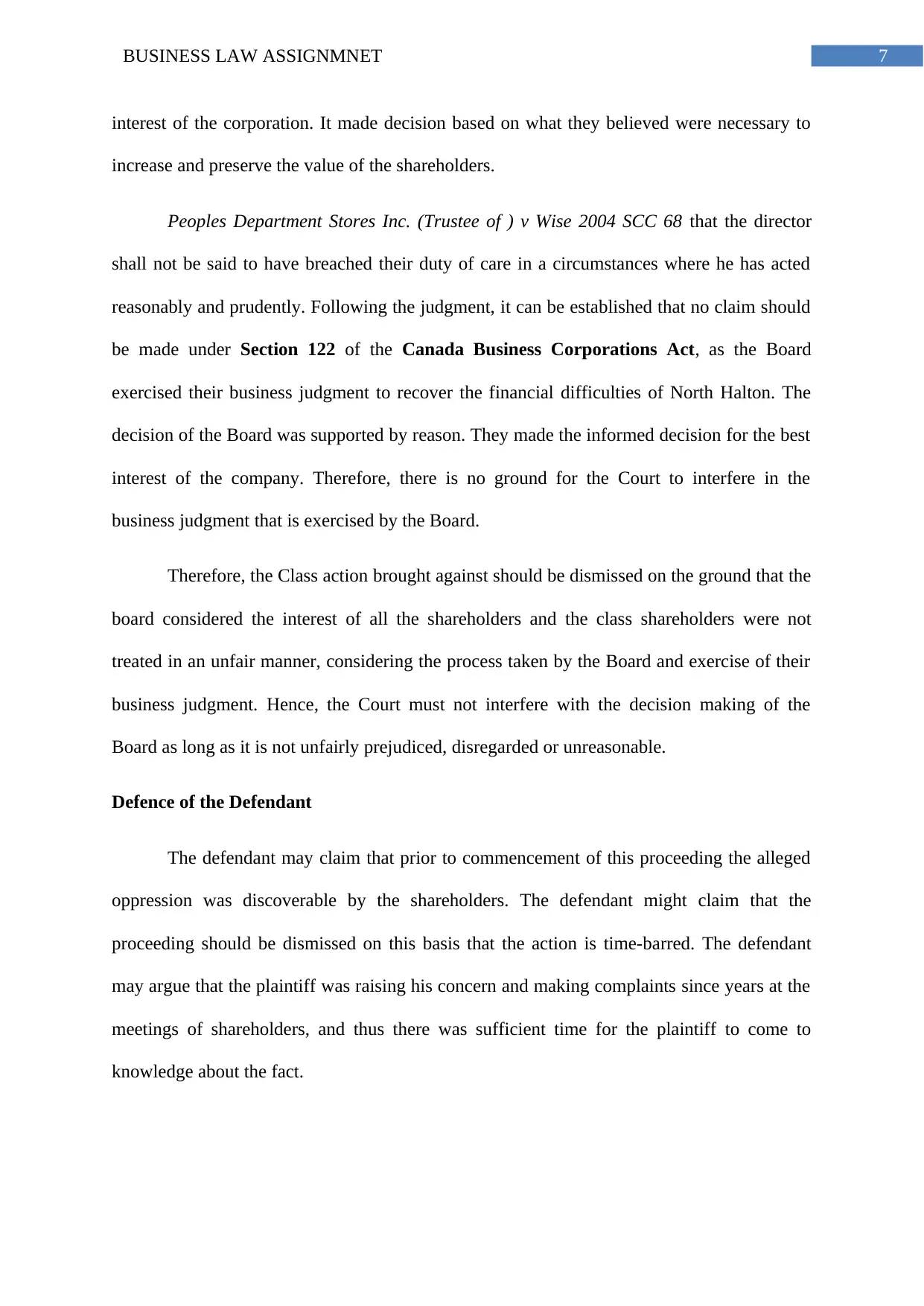
7BUSINESS LAW ASSIGNMNET
interest of the corporation. It made decision based on what they believed were necessary to
increase and preserve the value of the shareholders.
Peoples Department Stores Inc. (Trustee of ) v Wise 2004 SCC 68 that the director
shall not be said to have breached their duty of care in a circumstances where he has acted
reasonably and prudently. Following the judgment, it can be established that no claim should
be made under Section 122 of the Canada Business Corporations Act, as the Board
exercised their business judgment to recover the financial difficulties of North Halton. The
decision of the Board was supported by reason. They made the informed decision for the best
interest of the company. Therefore, there is no ground for the Court to interfere in the
business judgment that is exercised by the Board.
Therefore, the Class action brought against should be dismissed on the ground that the
board considered the interest of all the shareholders and the class shareholders were not
treated in an unfair manner, considering the process taken by the Board and exercise of their
business judgment. Hence, the Court must not interfere with the decision making of the
Board as long as it is not unfairly prejudiced, disregarded or unreasonable.
Defence of the Defendant
The defendant may claim that prior to commencement of this proceeding the alleged
oppression was discoverable by the shareholders. The defendant might claim that the
proceeding should be dismissed on this basis that the action is time-barred. The defendant
may argue that the plaintiff was raising his concern and making complaints since years at the
meetings of shareholders, and thus there was sufficient time for the plaintiff to come to
knowledge about the fact.
interest of the corporation. It made decision based on what they believed were necessary to
increase and preserve the value of the shareholders.
Peoples Department Stores Inc. (Trustee of ) v Wise 2004 SCC 68 that the director
shall not be said to have breached their duty of care in a circumstances where he has acted
reasonably and prudently. Following the judgment, it can be established that no claim should
be made under Section 122 of the Canada Business Corporations Act, as the Board
exercised their business judgment to recover the financial difficulties of North Halton. The
decision of the Board was supported by reason. They made the informed decision for the best
interest of the company. Therefore, there is no ground for the Court to interfere in the
business judgment that is exercised by the Board.
Therefore, the Class action brought against should be dismissed on the ground that the
board considered the interest of all the shareholders and the class shareholders were not
treated in an unfair manner, considering the process taken by the Board and exercise of their
business judgment. Hence, the Court must not interfere with the decision making of the
Board as long as it is not unfairly prejudiced, disregarded or unreasonable.
Defence of the Defendant
The defendant may claim that prior to commencement of this proceeding the alleged
oppression was discoverable by the shareholders. The defendant might claim that the
proceeding should be dismissed on this basis that the action is time-barred. The defendant
may argue that the plaintiff was raising his concern and making complaints since years at the
meetings of shareholders, and thus there was sufficient time for the plaintiff to come to
knowledge about the fact.
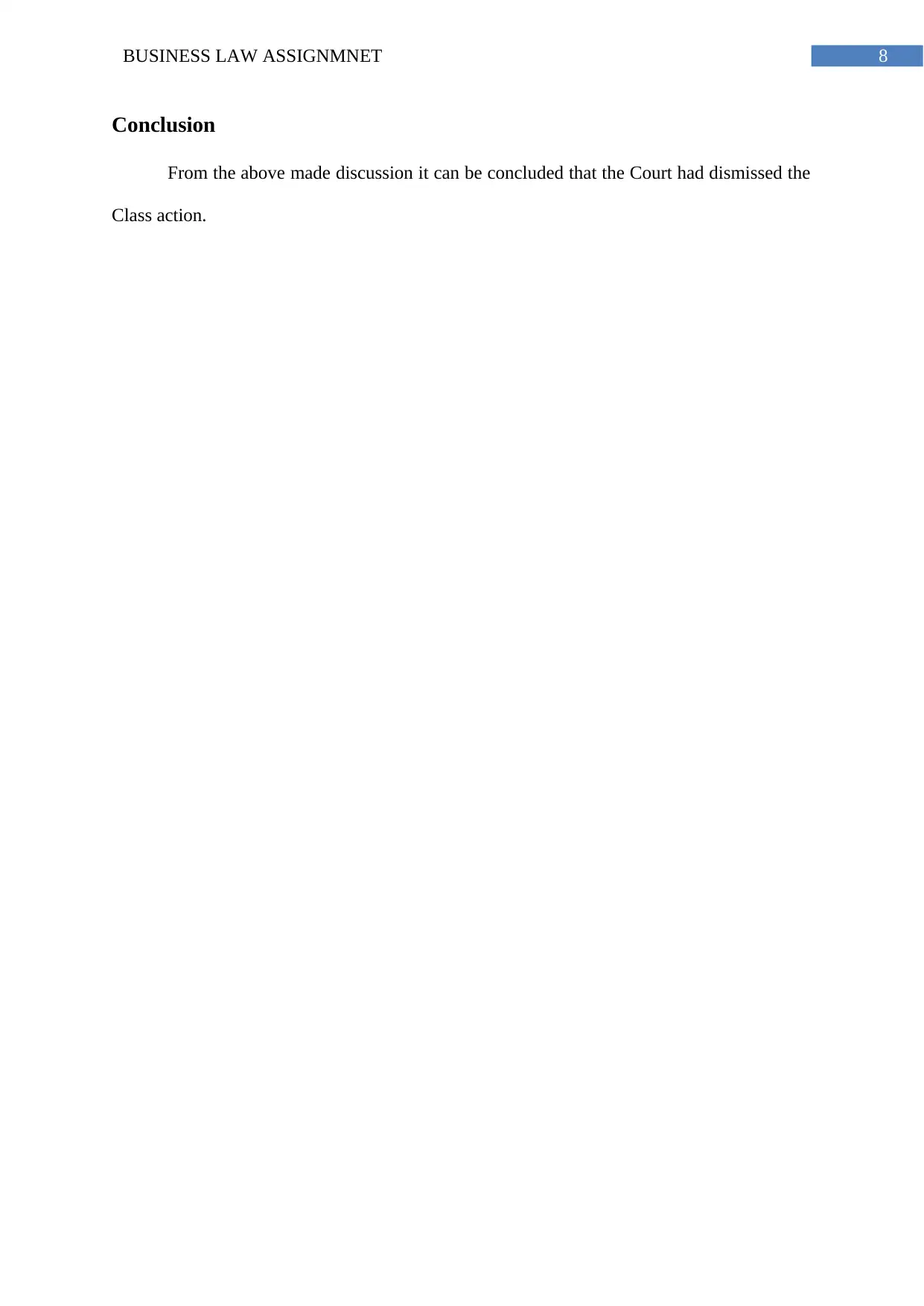
8BUSINESS LAW ASSIGNMNET
Conclusion
From the above made discussion it can be concluded that the Court had dismissed the
Class action.
Conclusion
From the above made discussion it can be concluded that the Court had dismissed the
Class action.
⊘ This is a preview!⊘
Do you want full access?
Subscribe today to unlock all pages.

Trusted by 1+ million students worldwide
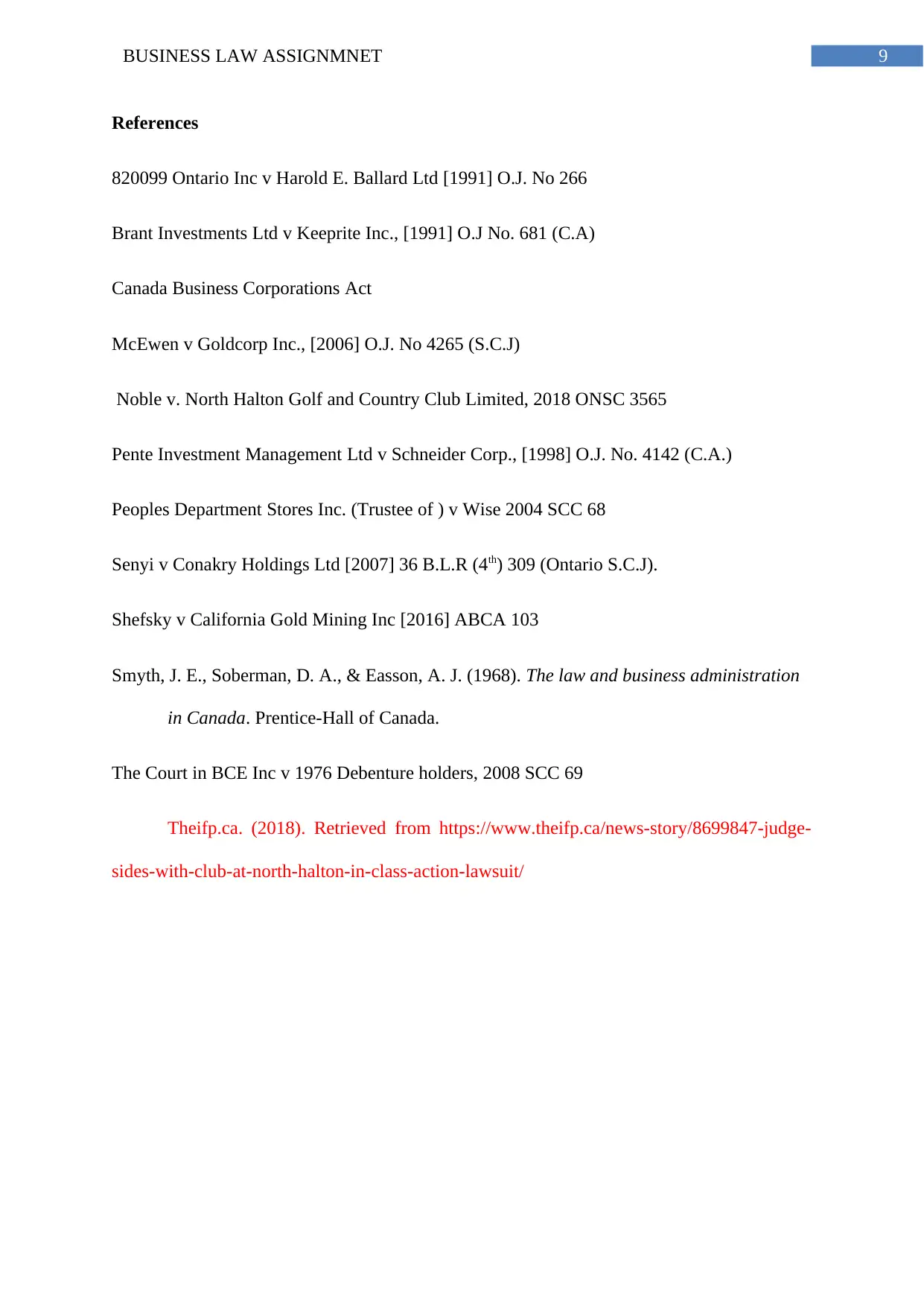
9BUSINESS LAW ASSIGNMNET
References
820099 Ontario Inc v Harold E. Ballard Ltd [1991] O.J. No 266
Brant Investments Ltd v Keeprite Inc., [1991] O.J No. 681 (C.A)
Canada Business Corporations Act
McEwen v Goldcorp Inc., [2006] O.J. No 4265 (S.C.J)
Noble v. North Halton Golf and Country Club Limited, 2018 ONSC 3565
Pente Investment Management Ltd v Schneider Corp., [1998] O.J. No. 4142 (C.A.)
Peoples Department Stores Inc. (Trustee of ) v Wise 2004 SCC 68
Senyi v Conakry Holdings Ltd [2007] 36 B.L.R (4th) 309 (Ontario S.C.J).
Shefsky v California Gold Mining Inc [2016] ABCA 103
Smyth, J. E., Soberman, D. A., & Easson, A. J. (1968). The law and business administration
in Canada. Prentice-Hall of Canada.
The Court in BCE Inc v 1976 Debenture holders, 2008 SCC 69
Theifp.ca. (2018). Retrieved from https://www.theifp.ca/news-story/8699847-judge-
sides-with-club-at-north-halton-in-class-action-lawsuit/
References
820099 Ontario Inc v Harold E. Ballard Ltd [1991] O.J. No 266
Brant Investments Ltd v Keeprite Inc., [1991] O.J No. 681 (C.A)
Canada Business Corporations Act
McEwen v Goldcorp Inc., [2006] O.J. No 4265 (S.C.J)
Noble v. North Halton Golf and Country Club Limited, 2018 ONSC 3565
Pente Investment Management Ltd v Schneider Corp., [1998] O.J. No. 4142 (C.A.)
Peoples Department Stores Inc. (Trustee of ) v Wise 2004 SCC 68
Senyi v Conakry Holdings Ltd [2007] 36 B.L.R (4th) 309 (Ontario S.C.J).
Shefsky v California Gold Mining Inc [2016] ABCA 103
Smyth, J. E., Soberman, D. A., & Easson, A. J. (1968). The law and business administration
in Canada. Prentice-Hall of Canada.
The Court in BCE Inc v 1976 Debenture holders, 2008 SCC 69
Theifp.ca. (2018). Retrieved from https://www.theifp.ca/news-story/8699847-judge-
sides-with-club-at-north-halton-in-class-action-lawsuit/
Paraphrase This Document
Need a fresh take? Get an instant paraphrase of this document with our AI Paraphraser
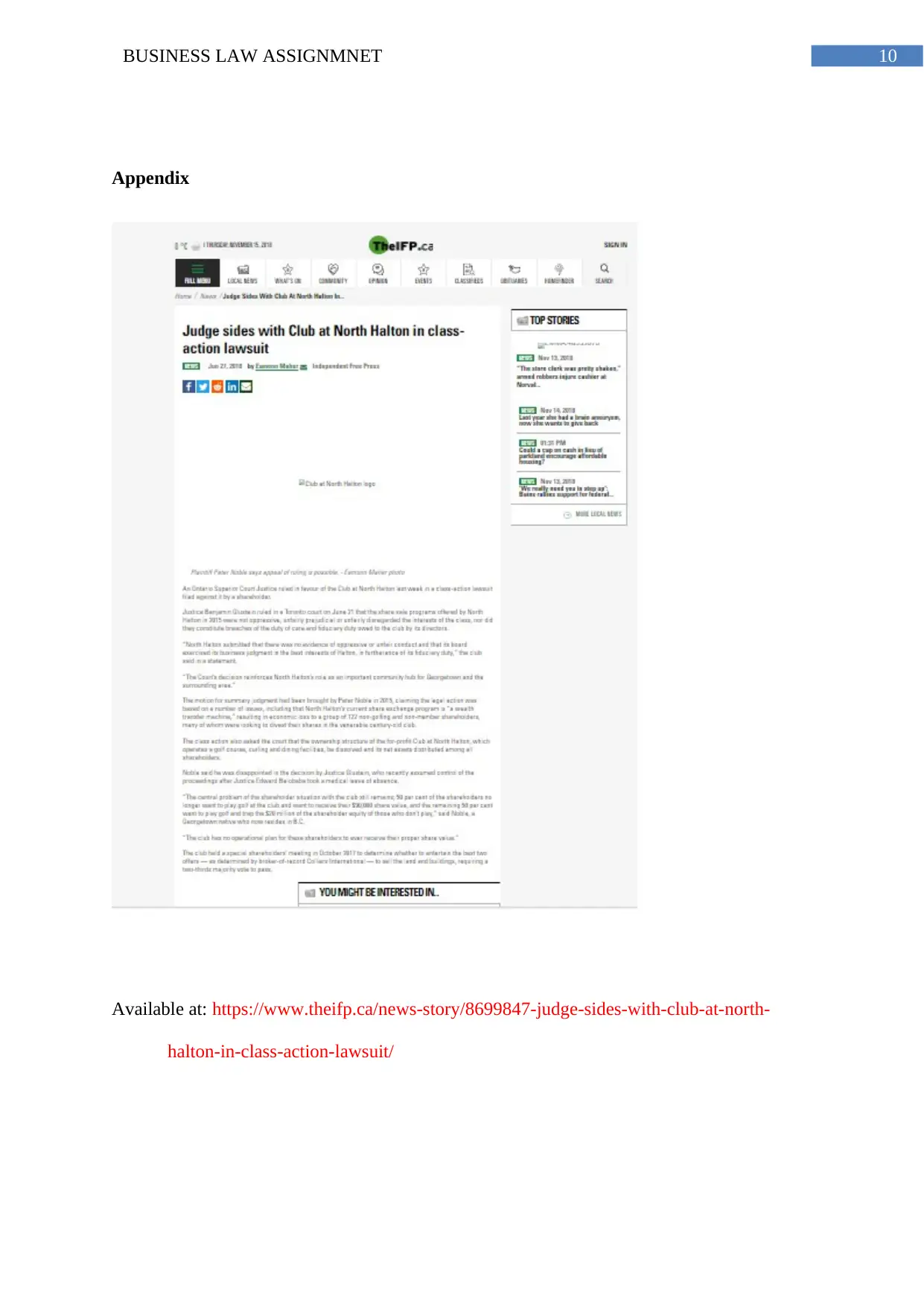
10BUSINESS LAW ASSIGNMNET
Appendix
Available at: https://www.theifp.ca/news-story/8699847-judge-sides-with-club-at-north-
halton-in-class-action-lawsuit/
Appendix
Available at: https://www.theifp.ca/news-story/8699847-judge-sides-with-club-at-north-
halton-in-class-action-lawsuit/
1 out of 11
Related Documents
Your All-in-One AI-Powered Toolkit for Academic Success.
+13062052269
info@desklib.com
Available 24*7 on WhatsApp / Email
![[object Object]](/_next/static/media/star-bottom.7253800d.svg)
Unlock your academic potential
Copyright © 2020–2025 A2Z Services. All Rights Reserved. Developed and managed by ZUCOL.





